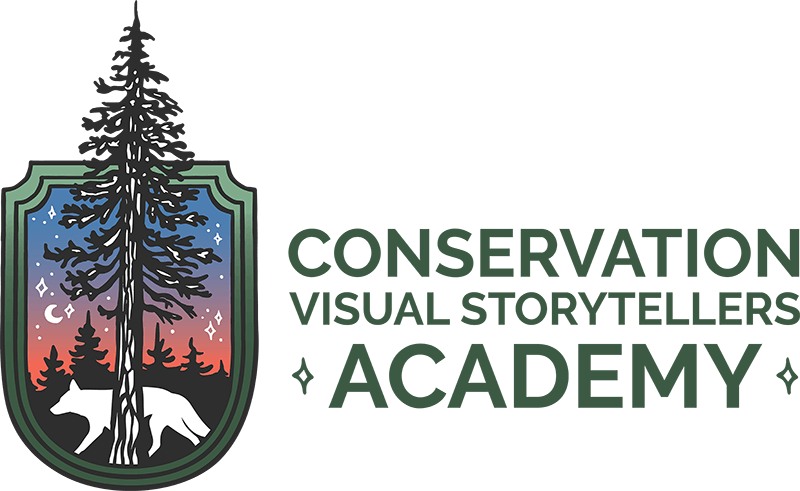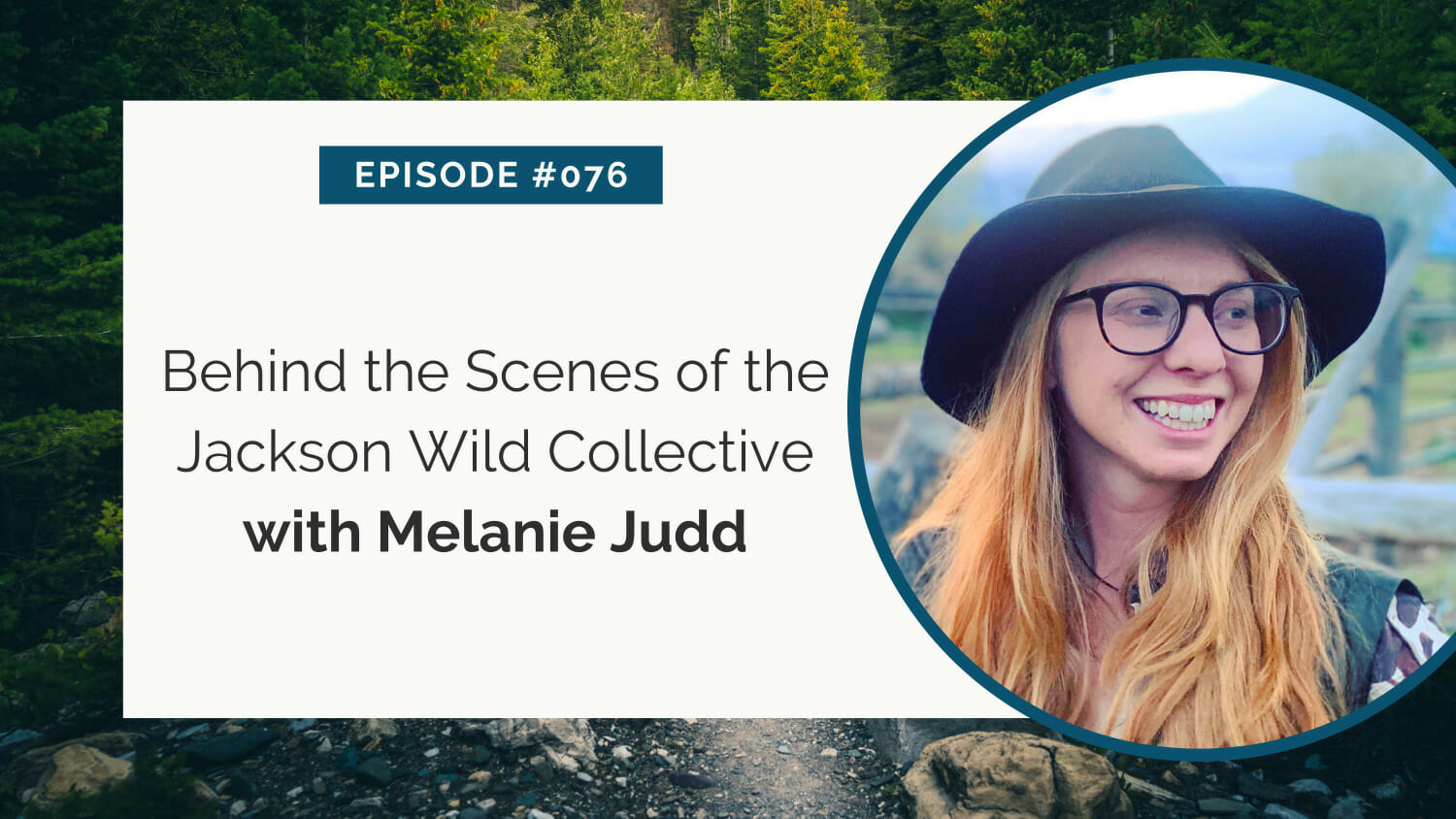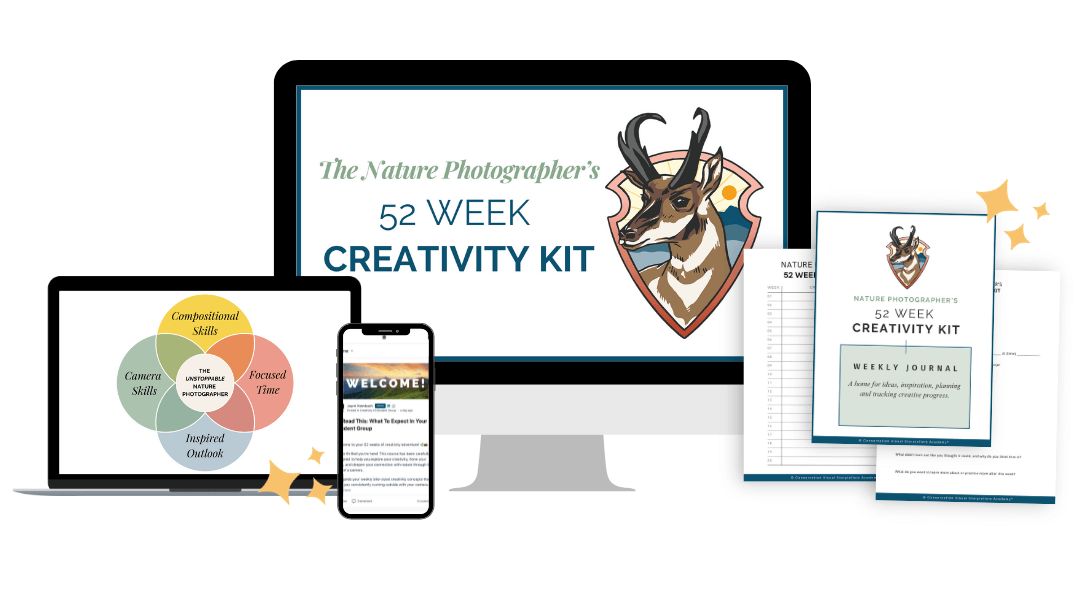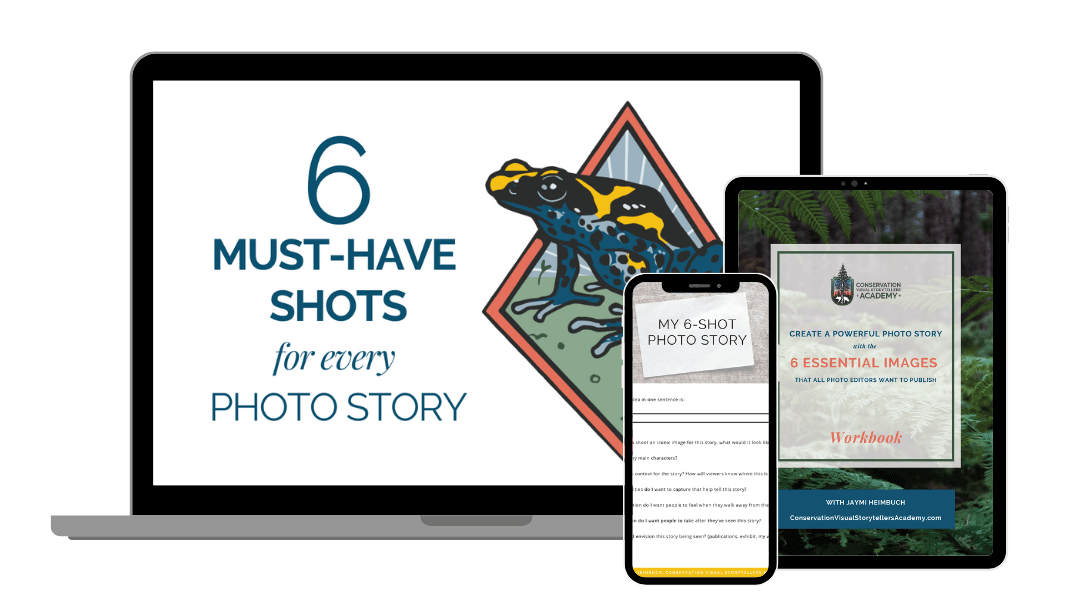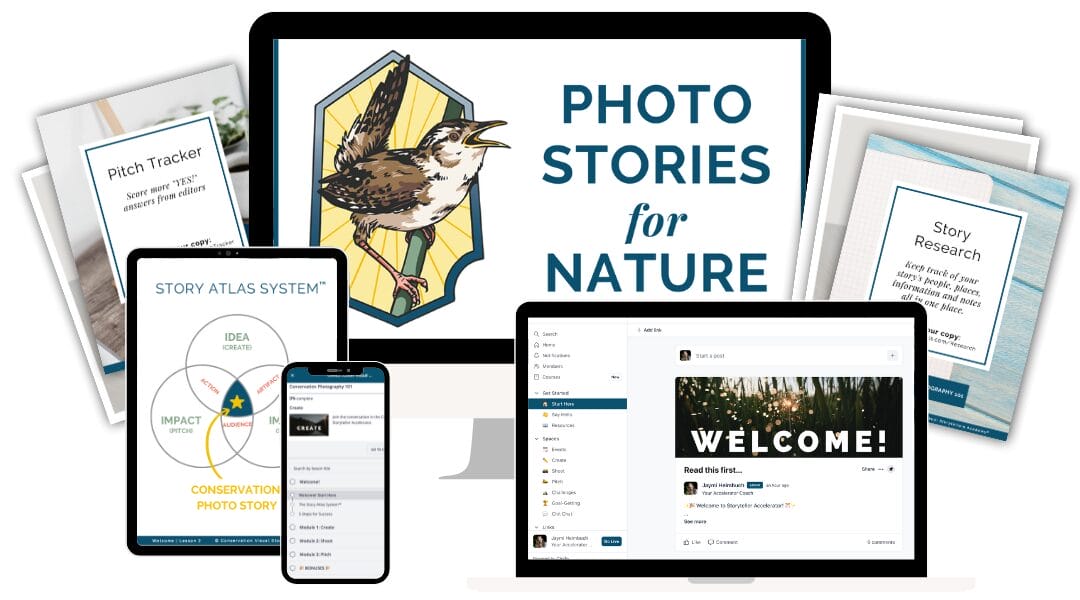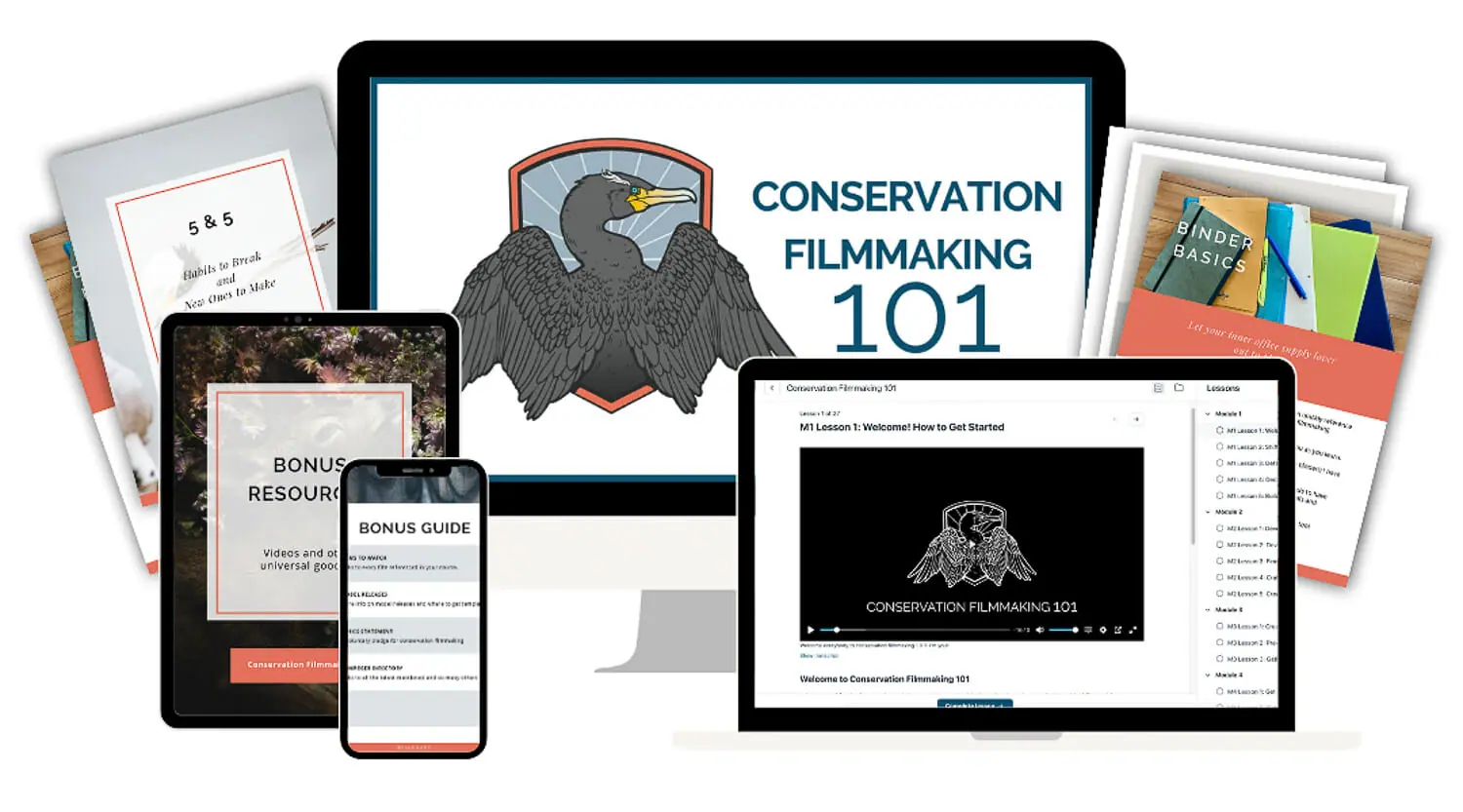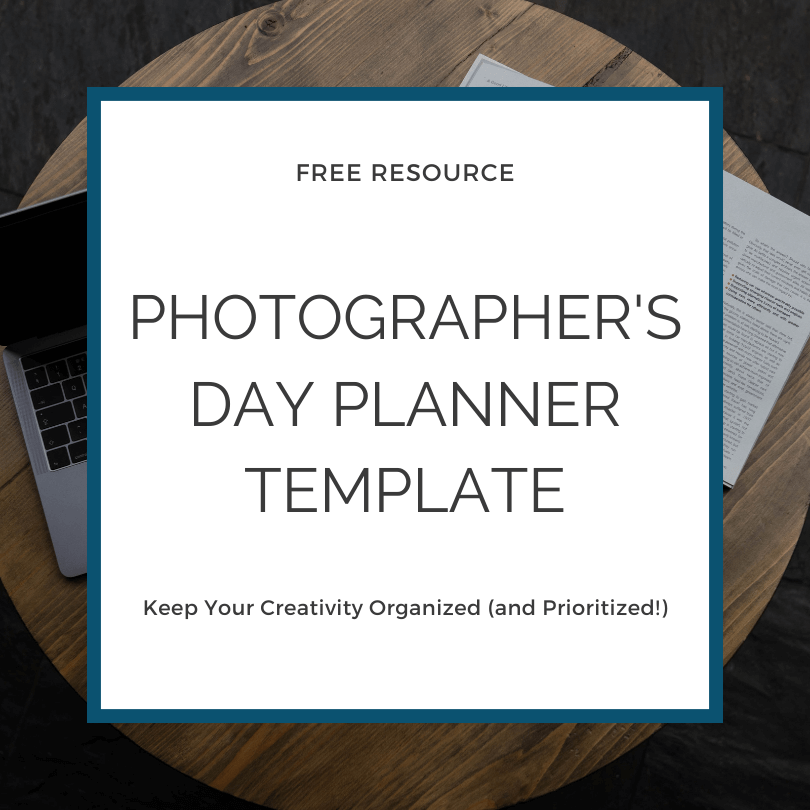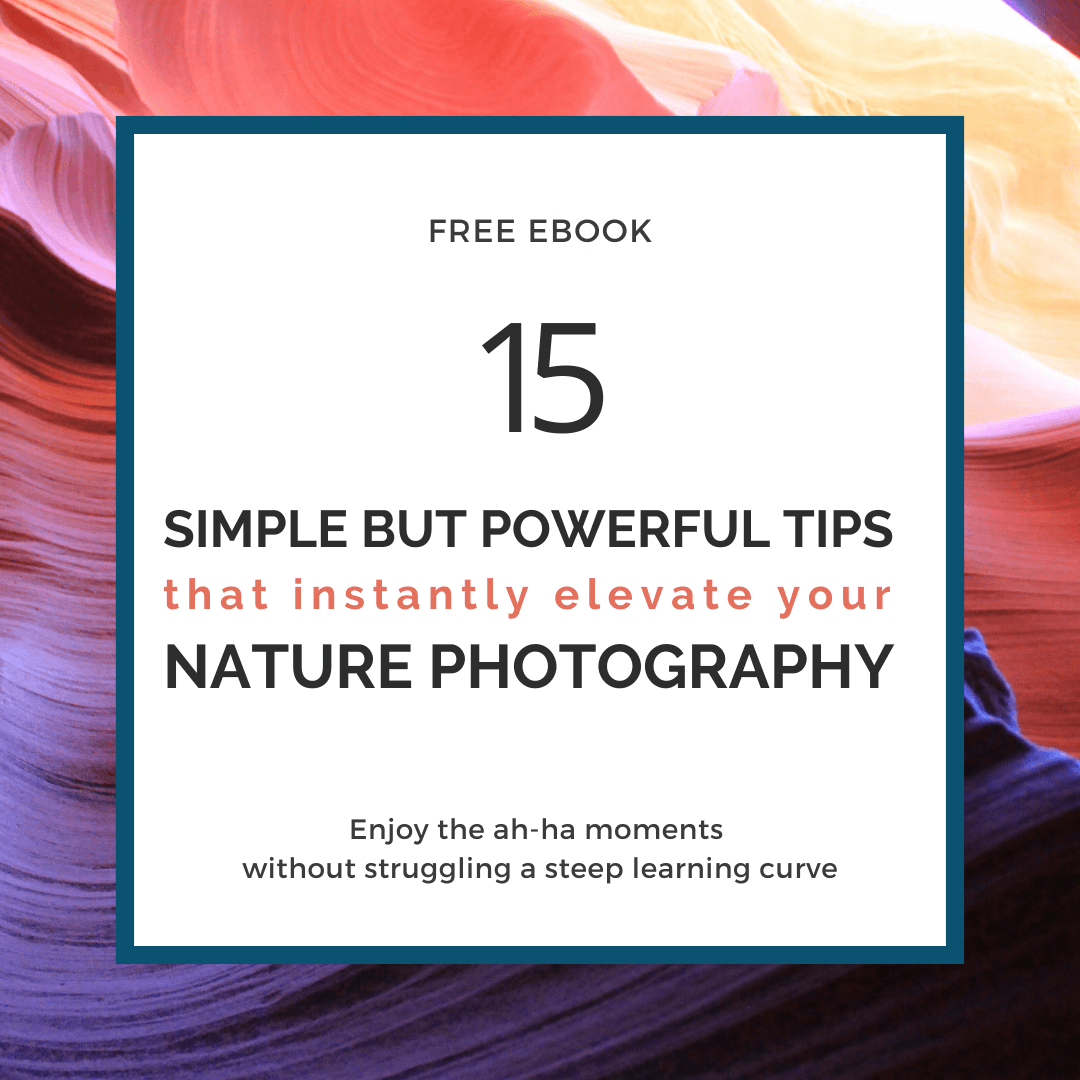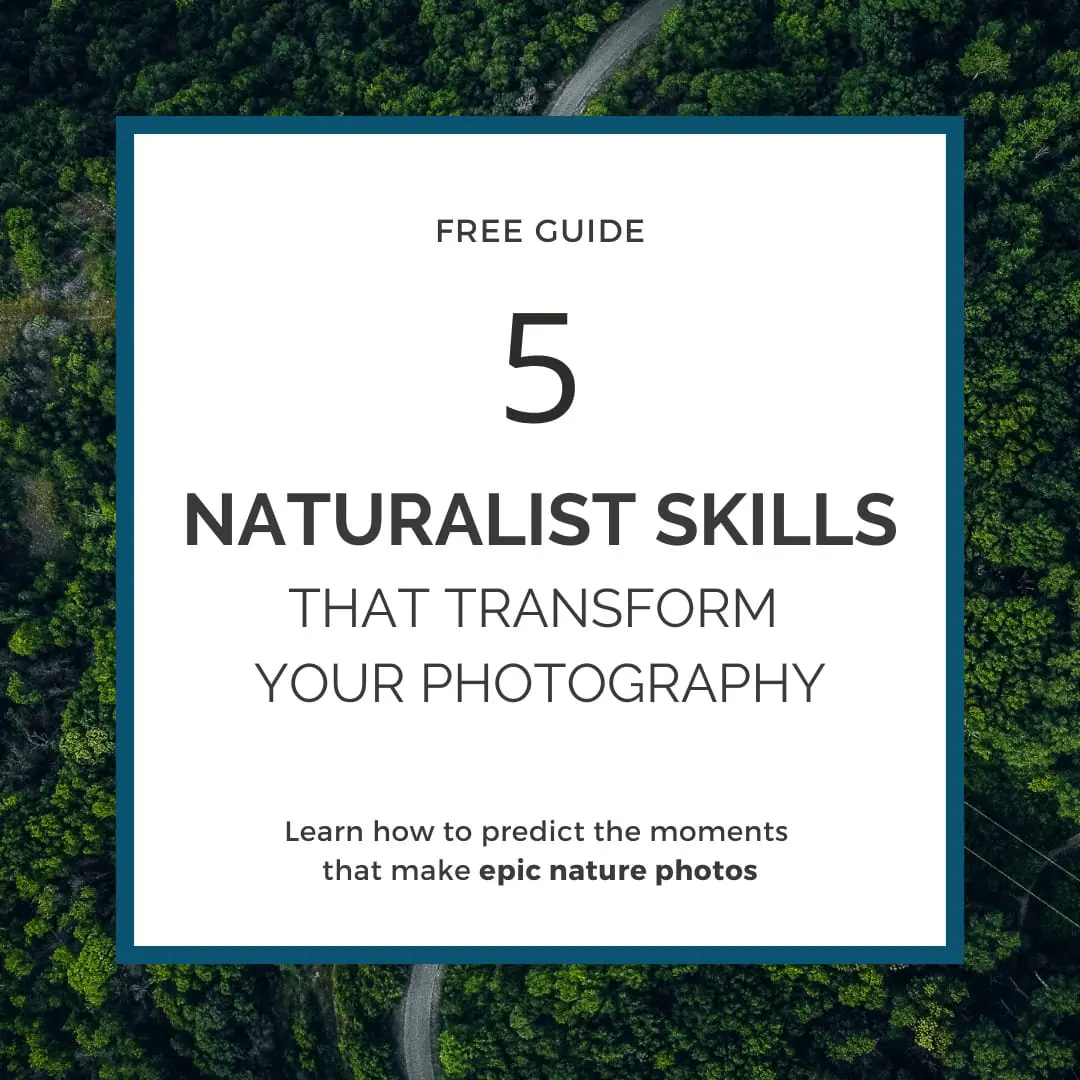Behind the Scenes of the Jackson Wild Collective with Melanie Judd
Get the insider scoop on Jackson Wild's new platform for environmental filmmakers.
If you're interested in the filmmaking side of conservation visual storytelling, then you likely already know about Jackson Wild.
But if this is a new name to you, well you'll know all about them by the end of this episode.
Jackson Wild is probably best known for its annual summit, where people from all over the world gather to watch amazing environmental and nature films, to network, and to collaborate.
Not only does this organization host an outstanding annual event, but it also hosts the Jackson Wild Media Lab, an amazing opportunity for aspiring filmmakers to learn all about science communication and filmmaking.
On top of all this, Jackson Wild has created yet another extraordinary thing: the Jackson Wild Collective.
I think of it as the LinkedIn of conservation filmmakers, scientists and composers and pretty much anyone interested in taking part in the filmmaking side of conservation visual storytelling.
It's been in beta mode for months, but has finally launched this May to the public. So I asked Melanie Judd, who's in charge of partnerships and engagement at Jackson Wild, to come on to the podcast and tell us all about the Jackson Wild Collective.
Enjoy this inside scoop on everything this new platform has to offer.
Resources Mentioned
Episode 076: Behind the Scenes of the Jackson Wild Collective with Melanie Judd
Shownotes: ConservationVisuals.com/76
(Digitally transcribed, please forgive any typos)
Jaymi Heimbuch:
If you are interested to any degree about the filmmaking side of conservation visual storytelling, then you likely already know about Jackson Wild, and if you don't know about Jackson Wild, well, you will by the end of this episode. Jackson Wild is this extraordinary entity inside of environmental filmmaking, and they're probably best known for the annual summit that they hold, where people from all over the world gather to watch just amazing environmental and nature films, to network and to collaborate. And so it's been this incredible annual event among filmmakers inside of conservation visual storytelling, but that's not all Jackson Wild does. They've also launched the Jackson Wild Media Lab, which you've heard about on this podcast before, it's this amazing opportunity for aspiring filmmakers to come out for a workshop that teaches all about science, communication and filmmaking. It's just an incredible opportunity.
0:01:00.4 JH: They also have done something else quite extraordinary, and that is, to launch the Jackson Wild Collective. And I think of it sort of like the LinkedIn of conservation filmmakers, but it's not just for filmmakers, it's also this virtual gathering area for scientists and composers and pretty much anyone interested in taking part in the filmmaking side of conservation visual storytelling. It's been in beta mode for months, but has finally launched this May to the public.
0:01:32.4 JH: So I asked Melanie Judd, who's in charge of partnerships and engagement at Jackson Wild, to come on to the podcast and tell us all about the Jackson Wild Collective. So she walks us through all that this new Collective has to offer for those who are interested and excited about conservation filmmaking and networking inside of this role. So let's dive in.
[music]
0:01:57.5 JH: Welcome to Impact: The Conservation Photography Podcast. I'm your host, Jaymi Heimbuch. And if you are a visual storyteller with a love for all things wild, then you're in the right place. From conservation to creativity, from business to marketing, and everything in between, this podcast is for you, the conservation visual storyteller who is ready to make an impact. Let's dive in.
[music]
0:02:29.7 JH: Melanie, welcome to Impact: The Conservation Photography Podcast for your very first podcast interview.
0:02:37.0 Melanie Judd: Thank you so much, it's great to be here.
0:02:40.0 JH: Well, it's a huge honor that Impact gets to be your very first interview, and there's so much goodness to dive into today, and I just really appreciate you being here.
0:02:50.8 MJ: Thank you, Jamie. I'm really, really grateful for the opportunity. So thank you.
0:02:55.5 JH: Yay. Well, so for those who don't know, would you mind giving us just sort of an introduction into who is Melanie and also your role at Jackson Wild?
0:03:06.4 MJ: Sure. Yeah, my name is Melanie Judd. I'm a nature lover like most of you out there, I'm sure. I have a cat, a black cat named Franklin, who is my best friend. I've had him for about 11 years, and we recently adopted a rescue dog, Fern, who's about 5 years old, so those are my priorities right now. I've been working with Jackson Wild for, gosh, six or seven years at this point. And I started there like pretty much everyone, as an intern, and six years later, I'm organizing our partnerships and engagement so very involved... Yeah, like that and the makings of the Jackson Wild Collective as well.
0:03:54.0 JH: So you've worked for Jackson Wild for a while, and if you started out as an intern and you are in your current position now, it must be an extraordinary organization to work for. I mean from the outside, Jackson Wild is this institution, and so from the inside, it must be an extraordinary place to be.
0:04:11.1 MJ: It really is, I feel so grateful for the opportunity to work with Lisa Samford, our executive director, and my amazing co-workers, Christie, Dana. We also expanded our team this year, so...
0:04:25.8 JH: That's exciting.
0:04:27.7 MJ: It's so exciting because it's just so reflective of the amount of work and programs and initiative we are doing that we need a bigger team. So we've added Jillian and Angelica this year, and it's just so inspiring to be surrounded by the community that really makes Jackson Wild so special that we are all united by our love of nature and our desire to make the world a better place, so it is really, really fulfilling, and it definitely feels like a dream job. I don't plan on going anywhere any time soon. [chuckle]
0:05:08.5 JH: I can imagine. So I have a photography background, not a filmmaking background, and so for me, learning about Jackson Wild, it's fairly new to me, last year was where I really understood what a phenomenal organization Jackson Wild is. And then part of that, it's because I finally went to the summit last year, which was held virtually, and realized... So first of all, the fact that you guys were so able to switch what is typically an in-person, really amazing event where people can network and make important professional connections and collaborative connections, and you managed to put that into an online platform that still felt like you could schmooze and network and do all the fun stuff, but what I really loved about it was it was the first time that I got to see what a leader Jackson Wild is in building community around conservation and filmmaking, and environmental filmmaking, and it seems like so much blossomed out of that summit in particular, is that true?
0:06:11.8 MJ: Definitely, yes, definitely. Yes, last year was a huge catalyst, and lots of initiatives and programs, the community really was forced to look at what wasn't working, and a lot of that was due to the fact that everyone was stuck at home, I mean productions were being halted because you couldn't get to where you needed to film. And I think also just everyone being in lockdown for so long really reminded us all how much we love the community that we are a part of, and with everyone not traveling, we were so much more plugged into our computers that we were able to have meetings with film crews who would usually be off in the Amazon or wherever. So yes, last year was a big catalyst year. As horrible as COVID was, it really has allowed us to do a lot of new and exciting things.
0:07:12.8 JH: Well, and I find it really admirable about how... I feel like the Jackson Wild team took a look at... Realized what it was that wasn't working. I'm gonna ask you about exactly what you mean by that, but to take a look at what's not working, and rather than be like, "Oh yeah, mm-hmm," you guys decided, We're gonna take this head on and do what we can to fix what isn't working. So what did you identify as things that are not working inside of the environmental filmmaking industry?
0:07:40.7 MJ: Sure, and I wanna clarify, it wasn't just the staff at Jackson Wild, it was our community that really raised these issues, and we are huge believers in collaboration and know that we wouldn't exist if it weren't for our amazing partners, our amazing board members, so it really was just from conversations. We were just talking to everyone and started hearing the same things coming up over and over, whether it was about the lack of diversity in the industry or the lack of local storytellers or local cinematographers that could continue the productions that were being halted because of COVID. We also kept hearing impact, impact has been very important thread in Jackson over the years, and so that was another area we decided to focus on as well as green filmmaking, which... Green filmmaking is very foreign to the wildlife filmmaking industry, which is kind of bizarre.
[chuckle]
0:08:50.3 JH: Tell us a little bit more for those where that's a new term. What do you mean by green filmmaking?
0:08:56.7 MJ: Yeah, definitely. So green, we mean environmentally conscious, thinking about the carbon footprint of a film, where it's easier, I think, for films happening in Hollywood to do that because you have recycling readily available, you can encourage people to bring their own water bottles, 'cause there's a water filtration system, which is not the case in the middle of the African savanna. So it's really taking a look at, what is that carbon footprint? How many plane trips are you taking across the globe to complete a production? What are you leaving behind? Is there a benefit? To the community that you have just filmed in, that you're leaving behind something, or is it extractive.
0:09:53.5 JH: That's really helpful. And that idea of green filmmaking really gets at a lot of what we're gonna talk about, which is another focus that you unlocked as a community last year, which is the need for local, hiring local talent, local filmmakers, local DPs, local people to create a film production team, which automatically reduces the carbon footprint and also reduces a lot of the big issue about diversity within environmental film making. So from these conversations, what were some of the really big aha things that started to lead you down the path toward the Jackson Wild Collective that we're gonna talk about pretty soon?
0:10:36.6 MJ: Definitely. I think the first thing was just that productions were being halted because you couldn't get film crews into certain locations, or maybe you did have a film crew and they were now stranded in that location, so I think that was the primary issue that really started all of the conversations about the Collective, like what can we do? How can we be better prepared in the future? And so I think that was probably the first aha moment as you said that, "Oh, we need to compile a list of everyone that has a set of skills in a specific area," so that you can't use the excuse of, "Oh, I didn't know there was a cinematographer in Zimbabwe," or wherever that you needed to film, like you can go to this one place, the Jackson Wild Collective and find exactly who you need in that moment.
0:11:43.7 JH: So the Jackson Wild Collective... 'Cause I was in there again today, just poking around, I've been very passive inside of there, and then today in preparation for this, I was like, "I'm really gonna dig in," and it's grown a lot since the last time that I was in there, and it really is a thorough LinkedIn of environmental filmmakers is what it feels like for me, because you've got people and resources, and I'm gonna let you dig into the details because I don't wanna do spoils, a bunch of spoiler alerts, but it's so fun to start to go down all of these rabbit holes that are actually inspiring and engaging rabbit holes. How did this whole concept of the Jackson Wild Collective... So from going from the idea that you're like, What we need, a list of people around the world who are working inside of this industry, so that no matter what, we know that we can tap really amazing, maybe new talent that's not getting tapped very often, or we can hire locally for when there are issues, the concept of building a list evolved into... I don't even know how to explain the Collective... Into this really beautiful engaging platform for networking for people inside the profession. How did you get from A to B?
[chuckle]
0:12:58.2 MJ: It was not a linear path.
[chuckle]
0:13:00.5 MJ: Yeah, lots of conversations and just... And lots of listening, lots of listening to our partners and those emerging filmmakers in other countries, and really listening to what it was that was... Our community needed. And so we realized, oh, training, different sorts of training opportunities are needed, mentorship opportunities are needed, and we also have lots of events, and we compiled... Started compiling these really amazing resources prior to the summit last year. Just kind of realized all of the different things we had and that the Collective really needed to serve as a virtual hub for all of that and for that ongoing year-round engagement as opposed to just meeting once a year in Jackson Hole or Austria, but really to continue engaging with the community. So we really just want to foster that year-round engagement.
0:14:04.1 JH: Okay, I really wanna get really nerdy about this, so how did you decide on the platform, because it's called Hivebrite, and so you decided on a platform that you could customize into this really amazing community. How did you decide on that versus building something from the ground up?
0:14:22.4 MJ: Definitely. Well, we had some really amazing help from the ladies at Her Wild Vision.
[chuckle]
0:14:29.4 JH: Unlimited amount of help. But yeah, so that was a really inspiring conversation.
0:14:33.8 MJ: Yeah, yeah, you guys definitely helped us conceptualize that. And I think one of the things we came up with together was that we really wanted this visual map where you could look at the map and find whoever it was, you could scroll through the globe and find people in different locations. So that was a priority of ours. There's a lot of different platforms out there, so we just kind of did a deep dive, did lots of demos, looked at lots of different platforms and just decided on this one because it really did check all of our boxes and it is still being updated and coming out with new features and things like that, so hopefully even more added customization in the future, but right now, yeah, it seemed to be really perfect for what we needed.
0:15:24.7 JH: Nice. Well, It is very feature-rich, and let's dig into some of what those features are.
0:15:30.9 MJ: Sure, yeah. Were there any you wanted to talk about in particular?
0:15:34.0 JH: Well, yeah, absolutely. Okay, so I'm gonna hop on here, so there's... I'm just gonna name out what the tabs are so that listeners can kind of get an idea of what's going on, so there's a Live Feed and then there's People, which is where you dig into all of the other folks who are part of the Collective. There's Events, Resources, and then inside of the resources, you can... You have a great search feature where you can dig down into things like contract templates or podcasts or websites or all of these other resources that you might need. There's Jobs and Opportunities, which I'm really excited about, Organizations, which is really cool. Portfolios, of people who are inside of the Collective, and you can dig into their portfolios of work, and then of course, there's the About section, which is... I always really enjoy About sections, I think that they're very fun, but one of the things that I would love to dig into first would be the people. Who gets into Jackson Wild Collective and what is it that they need to... What criteria do they need to fit to be part of the Collective?
0:16:37.9 MJ: Sure, yeah. So it's free to sign up, anyone can sign up. We do have just a very standard approval process for our basic members, and then we actually have an added layer of members called Collective Referred members, so those are the folks that we know personally or are very involved in our community. We've created several different paths of entry, really, to be a referred member, so any of our board members, any employees of the board members are referred, Collective Referred members. Finalist films, creators of finalist films, and any of our media competitions, which we run two a year, so that's a lot of folks right there. We have a mentorship program, and the mentors are able to refer mentees now, and then we also have our media labs, our different training programs, so if you've been involved in one of our media labs and we know you, we know your work, you're a referred member. And we also accept folks that request to be considered for the referral program as well, so it's definitely open.
0:17:53.4 JH: Wonderful. It's essentially as soon as you sign up, it's if you are a filmmaker at any level, is that correct, or do you need to be on the career track?
0:18:02.3 MJ: Yeah, no, filmmakers at any level, and photographers and scientists, sound engineers. You don't have to be a filmmaker. It takes all of us, it takes the conservationists and the scientists, and the filmmakers and the storytellers, and so it really is a home for all of us to come together.
0:18:22.0 JH: Wonderful. And okay, so let's dig into that other tab, the Resources. So inside of the Resources, there's a whole bunch that you can dig into from articles to... Like I said, it's lists of really great resources like podcasts, videos, websites, how are you pulling all of that together for folks to peruse through?
0:18:43.1 MJ: Yeah, a lot of them started with our action coalitions last year, which were those working groups that we really brought together to address those four topics we talked about earlier: Diversity, global storytelling, impact and green filmmaking, and those partners are all very active in those areas already. So they shared some really incredible resources with us. We, again, have really great partners and board members who have shared contract templates with us and best practice charters and different things like that, and then we also... We also just do a little Google search, find some resources that we really like. Again, we are all about collaboration, so we want to link to those other great resources. There's a really great Impact field guide on there from Doc Society. Definitely, you gotta check that out, it's a huge document. Yeah, there's some really great resources, but it's all because of our partners, really.
0:19:47.4 JH: Wonderful. And do members submit also what they might wanna have?
0:19:50.6 MJ: Yeah. They definitely can. Yes, they definitely can. I think they would just send something to Angelica and we would just review it and check it out, and you can share anything on the live feed as well, so if there was a specific resource that any member wanted to share, they could share that on the live feed with everyone.
0:20:09.1 JH: Great, okay. So now we need to dig into the Jobs and Opportunities section, which I know is a really core component of why the Collective was started in the first place, and a core component of why people are joining is because they want the opportunity to just know about what's out there, what role they might be able to fill for upcoming opportunities for gigs. So tell us about the Jobs and opportunities section of the Collective.
0:20:36.9 MJ: Yeah, definitely. I went on there earlier today, and there are so many. I think that's where the most opportunities really are, the chunk of the meat of the Collective is really within the Jobs and opportunities. But Angelica again, has been super active and just reaching out to our partners and wildlifefilm.com is always a great resource, they're very involved, and so yeah, we'll just post great opportunities and jobs that we find from our partners and other organizations. There are also some Collective specific opportunities, don't wanna give away too much, but we've got an upcoming MasterClass that we will be launching, I believe, in June, and so you'll hear more about that soon, which will be really fun, it's an editing MasterClass.
0:21:26.6 JH: Oh, nice. Very fun.
0:21:28.1 MJ: Yeah, we're excited about that, and then we've also been working with different organizations to offer scholarships and funding opportunities as well. We're working with Gulliard Films, which is offering a scholarship every year to one of our mentees to help create one of their films that they're dreaming to create, so yes, there's just gonna be tons of opportunities compiled from all of the amazing partners and organizations we have involved.
0:21:58.3 JH: Wonderful. Definitely... It was really fun going on there and poking around and seeing all of the folks who are familiar to me, a lot of the filmmakers who are in there, and so to see familiar faces, is really fun to get to know people and then to realize what it is that they're up to too, and to be able to support them, and it's really... What I love about this is that when you see an opportunity, at least in the conservation visual storytelling realm, we're the type of people where if you see an opportunity and it's not one that you're gonna take, you immediately send it to other people you know, like you really wanna support other people and your friends and your colleagues and really help out, and so now there's this place where when I see that, I don't have to just be like, "Well, I'm gonna email these four people I think might want this," I can put it inside of this Jobs and Opportunities, or send it to Angelica to put in there. And not only do the folks I know get to hear about it, but everybody does, and I think that that's a beautiful tool that you guys have created.
0:23:00.2 MJ: Definitely, definitely, thank you.
0:23:01.2 JH: So in terms of your goals for creating the Collective, especially with being able to find and hire local talent or increase diversity inside of this field, have you noticed that coming as a result? I know that this is just brand new, so it's maybe not even a fair question to ask yet, but have you noticed that happening or do you have any metrics to help know if you're accomplishing those big, beautiful goals you have?
0:23:26.3 MJ: I don't know what metrics we have. A lot of diversity qualities are not easily measured, and it maybe isn't our place to try to measure those, but I definitely feel a shift in the industry and just really, I think, having those conversations has been really revolutionary, just hearing... Talking with National Geographic and Discovery Channel about... And PBS, about their diversity initiatives and how they prioritize that and how they see the Collective as an asset because of that, I think, really just reflects on the industry as a whole and what we all recognize as important and what we recognize as missing. So yes, I definitely think there's a shift, and I'm hopeful.
0:24:18.8 JH: I have to say I completely agree with you, and I wouldn't have recognized that shift if it weren't for having co-founded Her Wild Vision initiative with Morgan Heim last summer, because one of the most exciting things that happened was as soon as we decided that we were gonna launch this, we started reaching out to people we knew and asking for folks to come and be editors of basically our review panel for the application. So Morgan and I don't touch them, our editors do, and of course, you are on our panel. Thank you so much for that.
0:24:51.5 MJ: I love it.
0:24:52.0 JH: But reaching out and asking some pretty big name people, which means very busy people inside of the industry, like Kathy Moran at National Geographic and asking Kathy Moran at National Geographic and asking [0:25:04.8] ____. These are people who have very little time and the response was an immediate yes, and not only, Yes, but, "Oh my god, what else can we do? This is something that we really want." In fact, Morgan sent an email to Melissa Dale at The Nature Conservancy, and she hit send, and within seconds, Melissa texted her with like, "Oh my god, we have to get on the phone right now."
0:25:28.9 JH: And so having that experience with Her Wild Vision, and that was how I met Sarah Joseph, who was a big leading figure in getting the Collective up and running, this concept that she had been batting around, and so to know that you have the same experience where, it's almost like... And by no means is Jackson Wild scrappy. You guys are just a really phenomenal entity, but I feel like the smaller entities have a little bit more drive and desire to create these resources that help these massive entities where everything is just bigger and more cumbersome and more difficult to make things happen, and we're providing tools for them to be able to do that and to see that that is desired and wanted and being utilized by these larger entities is incredibly inspiring.
0:26:16.1 MJ: Definitely, definitely. 100%.
0:26:19.5 JH: That was a little tangent. Sorry about that.
0:26:22.9 MJ: I'm there, no, you're spot on, you're spot on.
0:26:24.5 JH: Well, I love that you are having these conversations. What about the Jackson Collective has been most inspiring to you personally?
0:26:32.9 MJ: I think just a few things, one, seeing it come to fruition has been just kind of mind-blowing. I remember when it was just an idea that we were tossing around at a staff meeting and now for it to be this huge platform that everybody is pumped about and getting behind, I think has been really, really big for me, but I really think it's the individuals who have been so deeply involved and are just so passionate about it, whether it was... Like you mentioned Sarah Joseph, who has been...
0:27:05.8 JH: She's amazing.
0:27:07.0 MJ: She's the best. Hours and hours and hours. Sarah Joseph, Brooke Runnette and Jacqueline Farmer have been really great, great team, and that is really inspiring to see such amazing professional women, like the three of them really believing in this, I think has been huge. And then I think during the beta testing was a really, really kind of memorable part of it too, because we got to send our personal invites to our nearest and dearest to help us figure it out. We didn't... Collective definitely didn't look like it looks today, six months ago, and the beta testing was just a really, really neat way to start sharing that with some close people in our community and I think that was a really great thing.
0:28:02.0 JH: Yeah, I have to say, as someone who's built... The whole shopping around for a platform, "Do we build this from scratch? How are we gonna do this?" It is not a small thing to build what you have built regardless of the fact that it's on this platform that kind of like put some of the tools in place but, my god, the hours that go into really filling that as well as engaging your beta testers and engaging other people and making sure that it's being utilized and then listening to all of the feedback because you know you're getting a lot of suggestions and you know you have to file them into the, "There's no way we can do that. We might be able to do that, but in two years. Okay, well, we'll go ahead and do that now." you know, you're putting them into all these bins, and I just want to really say thank you so much to every single one of you guys who have spent the time to create this resource because like you said, it's free.
0:28:56.0 JH: This is something that is out there for filmmakers, for anyone who really wants to be part of the environmental filmmaking industry, whether you're a photographer or a scientist, or like you said, a sound engineer, composer, anyone who wants to be part of that, now here's this free resource that is like... I consider it like the LinkedIn, the big amazing networking opportunity of the Collective, so thank you for the hours of time and love and dedication that have been poured into this.
0:29:24.5 MJ: Well, thank you too. I mean you spent your fair share so thank you.
[chuckle]
0:29:29.1 JH: I just got to be... I got to just play around in there after it was built. It was quite fun.
[laughter]
0:29:36.1 MJ: Well, thank you.
0:29:37.7 JH: So what's next after launch? So by the time this airs, you'll have been open for about three weeks or so, what will you be focused on next as the Collective?
0:29:47.4 MJ: Yeah, definitely. I think keeping people engaged is gonna be a big focus. I already mentioned a couple of spoiler alerts. We've got some things in the pipeline that we'll keep doing that, we will keep adding trainings and opportunities, and more scholarships and more funding opportunities, so it's not over, it's just the beginning. And I think right now we've got just over 100 active users, we've got about 300 users in the database, but 100 of them are active, and we're gonna keep growing that, I mean that's a fraction of our community. So it's gonna keep growing, we're gonna keep adding opportunities. We also are gonna keep doing events. We wanna do events. We've been doing at least one virtual event a month, and we've got one scheduled for May, we're gonna do a mixer with Red, should be really fun. Yeah, just really trying to keep that ongoing year-round engagement, I think it's gonna be our focus and then not to mention the summit at the end of September, that is... It's well underway and [0:31:02.2] ____ face-to-face... Face-to-face and virtual, so it will be a hybrid event to maintain accessibility.
0:31:08.8 JH: So the summit is this thing that so many people look for, it is like... Especially if you're an environmental filmmaker, it is the event of the year, and I think it's gonna be really amazing to see for you who have been there for years and years, and you've seen what that event looks like to see what it's like after all of these folks have met and have been collaborating and networking and finding each other throughout the year, all of a sudden gathering at the summit, and how much more epic that's gonna make an in-person event.
0:31:40.2 MJ: Definitely. Oh, I'm so excited for that. I'm so excited.
0:31:43.3 JH: So Jackson Wild itself has been the main thing that's built this up, but not alone. So who are some of the sponsors that have helped make this happen, because this is labor-intensive and it's financially intensive. So who are some of the sponsors that have helped make the Collective happen?
0:31:58.9 MJ: Definitely, definitely. National Geographic Society has been involved from the beginning. HHMI Tangled Bank Studios has been super helpful. And Cornell Douglas University have all been funding partners, they're amazing, they always say yes to whatever crazy, crazy ideas that we're planning, so we're super grateful to the three of them, and then the rest of our board members, we have a really amazing set of board members that really do make the day in and day out possible here at Jackson Wild. And again, that core team, Sarah Brooke and Jacqueline, and then all of the action coalition members from last year have all really been the ones to make it possible so...
0:32:44.1 JH: Absolutely. So for all the listeners who are like, "I have got to be part of this," where do they go?
0:32:51.1 MJ: Definitely, you can go to jacksonwild.org, there's a link there. Otherwise, you can go to jacksonwildcollective.org and sign up.
0:33:02.7 JH: Perfect. Wonderful. Well, Melanie, thank you so much for being here today and for... We've broken you into podcasting, so now it's gonna be interview after interview, I'm sure. But thank you so much for taking time out to tell us all about the Collective and the inspiring network that it is, and I wish you all the best of luck on launch day, hurray!
0:33:24.6 MJ: Thank you so much, Jamie. We really, really appreciate it. And we are very excited. Thank you so much.
0:33:29.9 JH: Wonderful.
[music]
0:33:35.2 JH: Before we wrap up, I would love to ask you to do one quick thing, subscribe to this podcast. As a subscriber, you'll not only know when each week's episode goes live but you'll also get insider goodies like bonus episodes. You might miss them unless you're subscribed and I don't want you to miss out on a thing. So please tap that subscribe button and I will talk to you next week.
